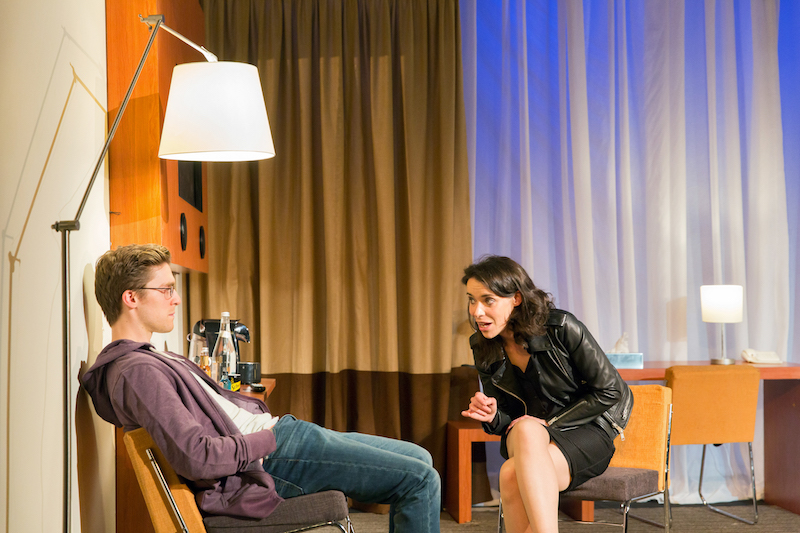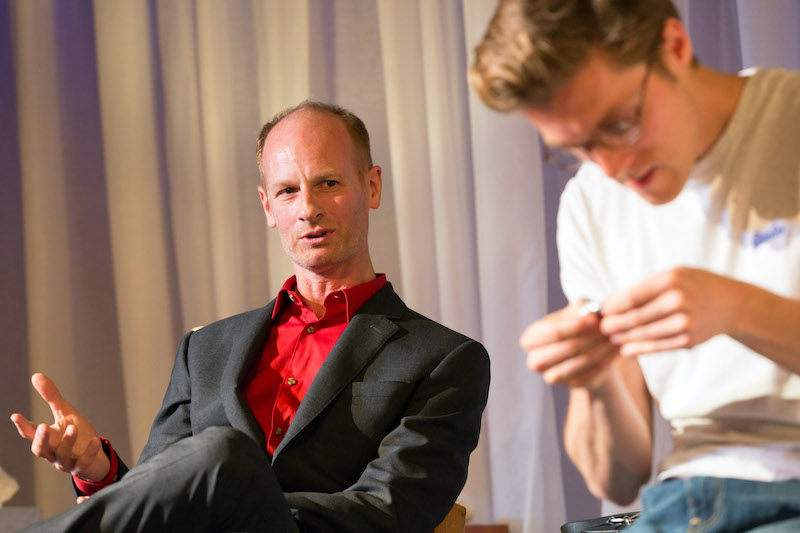Who do you trust? The EU Referendum campaign has exposed a mounting suspicion of the establishment, from financial institutions to press and politicians, and our sense of nationhood has never been murkier. But if we cease to believe in anything, how does that affect our sense of self?
Mike Bartlett’s latest takes Edward Snowden as a jumping-off point for this existential exploration. American leaker Andrew (Jack Farthing, pictured below with Caoilfhionn Dunne) is holed up in a Russian hotel room, awaiting contact from a man holed up in an embassy – a fellow member of the “everyone wants you dead” club. Instead, he receives two separate visitors (Caoilfhionn Dunne and John Mackay), both calling themselves George and purporting to represent Assange’s organisation – which needs Andrew for its image rehab. But are they real allies or undercover traitors, and can he – or we – trust anything they say? Bartlett’s form queasily mirrors his content, with the two Pinteresque subtly threatening strangers employing interrogation techniques while apparently offering assistance. Dunne, who “distracts with whimsy”, is deliberately provoking, with her studied kookiness, bungled flirtation and evasive answers. She needles and belittles Andrew, questioning his motives, his intelligence, his patriotic loyalty, until he heatedly engages. Mackay’s morose visitor, in contrast, calmly breeds terror. One is on suicide watch, the other hints at assassination.
Bartlett’s form queasily mirrors his content, with the two Pinteresque subtly threatening strangers employing interrogation techniques while apparently offering assistance. Dunne, who “distracts with whimsy”, is deliberately provoking, with her studied kookiness, bungled flirtation and evasive answers. She needles and belittles Andrew, questioning his motives, his intelligence, his patriotic loyalty, until he heatedly engages. Mackay’s morose visitor, in contrast, calmly breeds terror. One is on suicide watch, the other hints at assassination.
Their refusal to ensure his safety unless Andrew joins their ranks and accepts that some work must take place in the dark taps into the security versus transparent democracy argument, however that debate is voiced almost more than illustrated. Much of the 100-minute running time feels like a staged seminar, recapping the privacy and autonomy we’ve sacrificed to governments and technology companies in exchange for free services and abstract protection. Like James Graham’s similarly themed Privacy, the sheer weight of ideas occasionally overwhelms the drama.
Until the last 10 minutes, when the reason for the production’s set-related delays suddenly becomes clear. Miriam Buether’s astonishing coup de theatre turns the philosophy lesson into an intensely immersive experience, building on the le Carré spy drama paranoia – flickering lights, code names and constant reversals – and finding a striking postmodern form for the off-kilter ambiguity and gradual loss of faith in every part of our reality. Even the physical and tangible can lie.
 Farthing vividly communicates the dislocation and isolation of the whistleblower, whose altruism may not be entirely what it seems. Bartlett suggests a desire for travel and adventure that has – ironically – left him imprisoned in limbo, the only escape route involving once again sacrificing his personal identity to an unwieldy, morally dubious organisation. There’s poignancy in the realisation that, at 28, he’s already done the one thing that will forever define him. Dunne and Mackay (pictured above right with Farthing) are excellent as the ever-shifting ciphers.
Farthing vividly communicates the dislocation and isolation of the whistleblower, whose altruism may not be entirely what it seems. Bartlett suggests a desire for travel and adventure that has – ironically – left him imprisoned in limbo, the only escape route involving once again sacrificing his personal identity to an unwieldy, morally dubious organisation. There’s poignancy in the realisation that, at 28, he’s already done the one thing that will forever define him. Dunne and Mackay (pictured above right with Farthing) are excellent as the ever-shifting ciphers.
James Macdonald’s production is necessarily static, trapped as it is in this impersonal, liminal space, but could use more bursts of strangeness to animate the discussion, like the surreal Russian cartoon that plays over a scene change. It’s a meaty piece, tackling the decline of the supposedly “free” world and suggesting that, in the surveillance era, real power comes from anonymity, but only the grand finale finds a totally innovative theatrical form for those urgent ideas.















Add comment